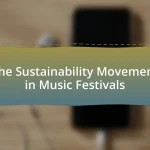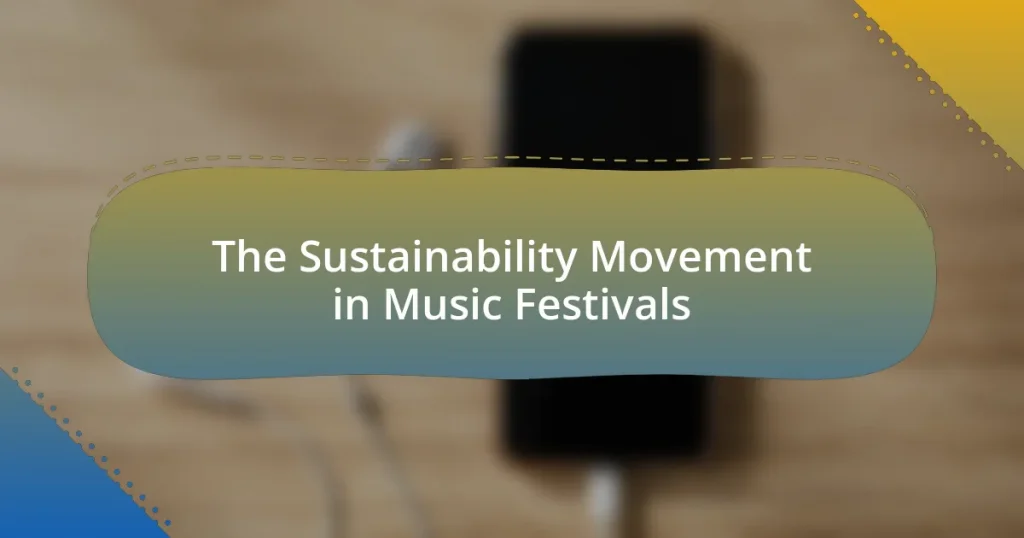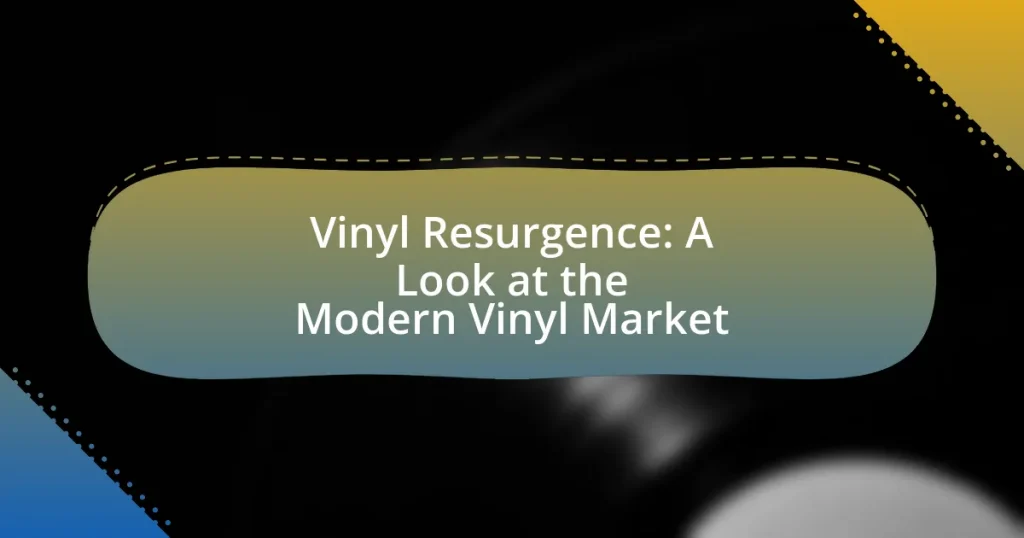The Sustainability Movement in Music Festivals encompasses efforts to mitigate the environmental impact of music festivals through practices such as waste reduction, energy efficiency, and eco-friendly transportation. This movement emerged in the early 2000s, influenced by historical environmental events and growing societal awareness of climate change. Key principles include waste management, resource conservation, and community engagement, with successful examples like Glastonbury and Coachella demonstrating effective sustainability initiatives. Festivals face challenges in implementing these practices but can achieve financial viability through strategic partnerships and innovative approaches to sustainability.
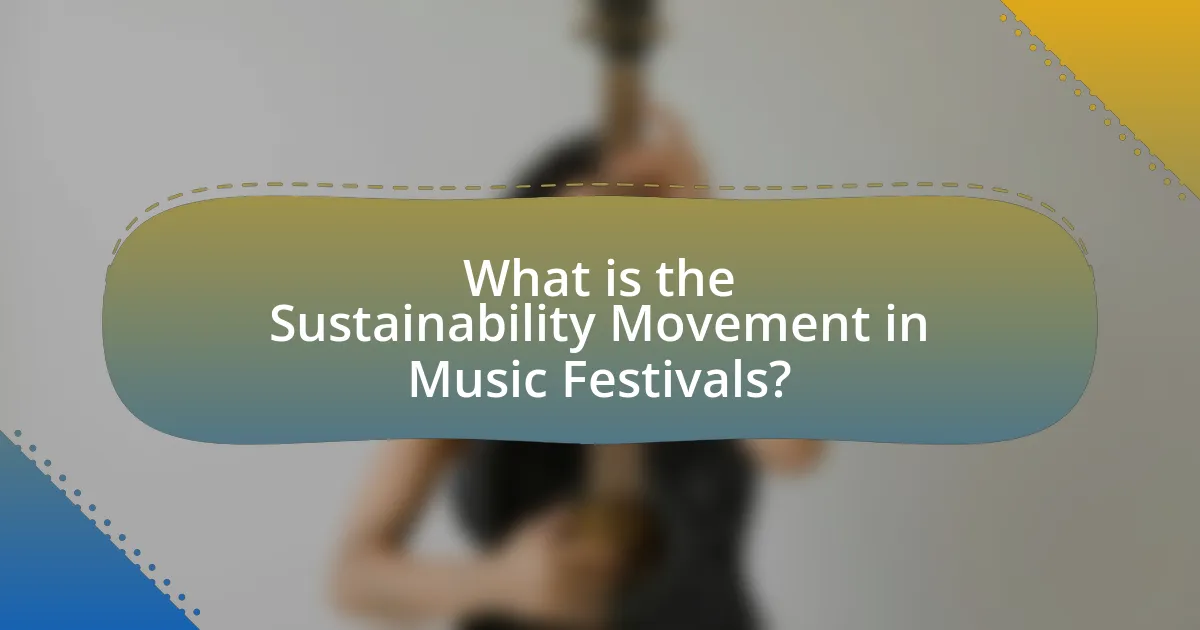
What is the Sustainability Movement in Music Festivals?
The Sustainability Movement in Music Festivals refers to the collective efforts to reduce the environmental impact of music festivals through sustainable practices. This movement encompasses initiatives such as waste reduction, energy efficiency, and the promotion of eco-friendly transportation options. For instance, festivals like Glastonbury have implemented measures to minimize plastic use and enhance recycling efforts, while others, like Coachella, have invested in renewable energy sources. These actions are supported by research indicating that large-scale events contribute significantly to carbon emissions and waste generation, prompting the need for sustainable solutions in the industry.
How did the Sustainability Movement in Music Festivals begin?
The Sustainability Movement in Music Festivals began in the early 2000s as a response to the environmental impact of large-scale events. Festivals like Glastonbury in the UK initiated efforts to reduce waste and promote eco-friendly practices, such as recycling and the use of renewable energy sources. This movement gained momentum as awareness of climate change increased, leading to more festivals adopting sustainable practices, including carbon offsetting and local sourcing of food and materials. By 2019, over 70% of major music festivals had implemented sustainability initiatives, demonstrating a significant shift towards environmentally responsible event management.
What historical events influenced the rise of sustainability in music festivals?
The rise of sustainability in music festivals has been influenced by several historical events, notably the environmental movement of the 1960s and 1970s, which raised awareness about ecological issues. The first Earth Day in 1970 galvanized public interest in environmental protection, leading to increased advocacy for sustainable practices. Additionally, the 1999 Woodstock festival, which faced significant criticism for its environmental impact, highlighted the need for more responsible event management. This criticism prompted many festivals to adopt sustainable practices, such as waste reduction and renewable energy use. Furthermore, the 2005 Live Earth concerts aimed to raise awareness about climate change, further embedding sustainability into the ethos of music festivals. These events collectively contributed to the ongoing integration of sustainability into the planning and execution of music festivals.
How have societal attitudes towards sustainability changed over time?
Societal attitudes towards sustainability have evolved significantly from the 1970s to the present day, shifting from a niche concern to a mainstream priority. Initially, environmental issues were largely viewed as the responsibility of activists and scientists, but over time, awareness has grown due to increased visibility of climate change, pollution, and resource depletion. For instance, the establishment of Earth Day in 1970 marked a pivotal moment, raising public consciousness about environmental issues. By the 1990s, sustainability began to be integrated into corporate practices, influenced by consumer demand for eco-friendly products. Recent studies, such as the 2021 Global Sustainability Study by Simon-Kucher & Partners, indicate that over 70% of consumers now consider sustainability when making purchasing decisions, reflecting a profound shift in societal values. This change is also evident in the music festival industry, where events increasingly prioritize sustainable practices, driven by audience expectations and a collective commitment to environmental stewardship.
Why is sustainability important for music festivals?
Sustainability is important for music festivals because it minimizes environmental impact and promotes social responsibility. Music festivals generate significant waste, with studies indicating that a single festival can produce over 1,000 tons of waste, including plastic, food waste, and other materials. By implementing sustainable practices, such as waste reduction, recycling, and the use of renewable energy sources, festivals can significantly lower their carbon footprint. Additionally, sustainable festivals often enhance the experience for attendees by fostering a sense of community and encouraging eco-friendly behaviors, which can lead to increased attendance and support from environmentally conscious consumers.
What environmental impacts do music festivals have?
Music festivals have significant environmental impacts, primarily through waste generation, carbon emissions, and resource consumption. For instance, a study by the University of California found that large festivals can produce over 1,000 tons of waste, much of which is not recycled. Additionally, transportation to and from these events contributes to greenhouse gas emissions, with a single festival potentially generating thousands of tons of CO2. Water usage is also a concern, as festivals often require substantial amounts for sanitation and hydration, straining local resources. These factors highlight the need for sustainable practices within the music festival industry to mitigate their environmental footprint.
How does sustainability enhance the festival experience for attendees?
Sustainability enhances the festival experience for attendees by promoting a healthier environment and fostering a sense of community. When festivals implement sustainable practices, such as waste reduction, renewable energy use, and local sourcing, attendees benefit from cleaner air, reduced waste, and a more enjoyable atmosphere. For instance, a study by the University of California found that festivals adopting sustainable measures saw a 30% increase in attendee satisfaction due to improved environmental conditions and community engagement. This connection to sustainability not only enriches the overall experience but also aligns with the values of many festival-goers who prioritize eco-consciousness.
What are the key principles of sustainability in music festivals?
The key principles of sustainability in music festivals include waste reduction, resource conservation, community engagement, and environmental protection. Waste reduction focuses on minimizing single-use plastics and promoting recycling and composting, as evidenced by festivals like Glastonbury, which implemented a comprehensive waste management system that diverted over 50% of waste from landfills. Resource conservation involves using renewable energy sources, such as solar power, to reduce carbon footprints; for instance, Coachella has utilized solar panels to power stages. Community engagement emphasizes local sourcing of food and materials, supporting local economies and reducing transportation emissions, as seen in festivals that prioritize local vendors. Lastly, environmental protection includes measures to preserve natural habitats and biodiversity, with festivals like Bonnaroo implementing initiatives to restore local ecosystems. These principles collectively contribute to a more sustainable approach to organizing and experiencing music festivals.
What practices are commonly adopted to promote sustainability?
Common practices adopted to promote sustainability in music festivals include waste reduction, energy efficiency, and sustainable sourcing. Waste reduction is achieved through initiatives like recycling and composting, which help divert significant amounts of waste from landfills; for instance, festivals like Glastonbury have reported recycling rates exceeding 50%. Energy efficiency is promoted by utilizing renewable energy sources, such as solar panels, which can power stages and facilities, reducing reliance on fossil fuels. Sustainable sourcing involves selecting local and organic food vendors, which not only supports local economies but also minimizes carbon footprints associated with transportation. These practices collectively contribute to a more sustainable festival experience, aligning with the broader sustainability movement.
How do festivals measure their sustainability efforts?
Festivals measure their sustainability efforts through various metrics, including waste reduction, energy consumption, and carbon footprint assessments. These metrics are often quantified using tools like the Global Reporting Initiative (GRI) standards, which provide a framework for reporting on environmental impacts. For instance, festivals may track the percentage of waste diverted from landfills, aiming for targets such as 75% diversion rates, as seen in events like the Bonnaroo Music and Arts Festival. Additionally, many festivals conduct post-event surveys to gather data on attendee behaviors related to sustainability, such as the use of public transportation or eco-friendly products. This data helps festivals evaluate their effectiveness in promoting sustainable practices and informs future initiatives.
How do music festivals implement sustainable practices?
Music festivals implement sustainable practices by incorporating waste reduction, renewable energy sources, and eco-friendly transportation options. For instance, many festivals adopt a comprehensive recycling and composting program to minimize landfill waste, with events like Glastonbury reporting a 50% reduction in waste through these initiatives. Additionally, festivals increasingly utilize solar panels and wind turbines to power stages and facilities, significantly lowering their carbon footprint. Furthermore, organizers often promote public transport, carpooling, and biking to reduce emissions associated with attendee travel, as seen in events like Coachella, which encourages shuttle services and bike parking. These practices collectively contribute to a more sustainable festival experience.
What role do vendors play in promoting sustainability at festivals?
Vendors play a crucial role in promoting sustainability at festivals by providing eco-friendly products and services that reduce environmental impact. They contribute by offering biodegradable or reusable food containers, sourcing local and organic ingredients, and minimizing waste through efficient inventory management. For instance, a study by the Green Music Initiative found that festivals that partnered with sustainable vendors reduced waste by up to 30%. Additionally, vendors can educate festival-goers about sustainable practices, further enhancing the overall commitment to environmental responsibility at these events.
How can festival-goers contribute to sustainability efforts?
Festival-goers can contribute to sustainability efforts by practicing waste reduction, utilizing public transportation, and supporting eco-friendly vendors. By minimizing single-use plastics and properly sorting waste into recycling and compost bins, attendees can significantly decrease the environmental impact of festivals. According to a study by the Green Music Initiative, festivals can generate up to 1,000 tons of waste, highlighting the importance of individual actions in waste management. Additionally, using public transport or carpooling reduces carbon emissions associated with travel, further supporting sustainability goals. Supporting vendors that prioritize sustainable practices, such as offering organic food and biodegradable products, encourages a shift towards environmentally responsible consumption within the festival industry.
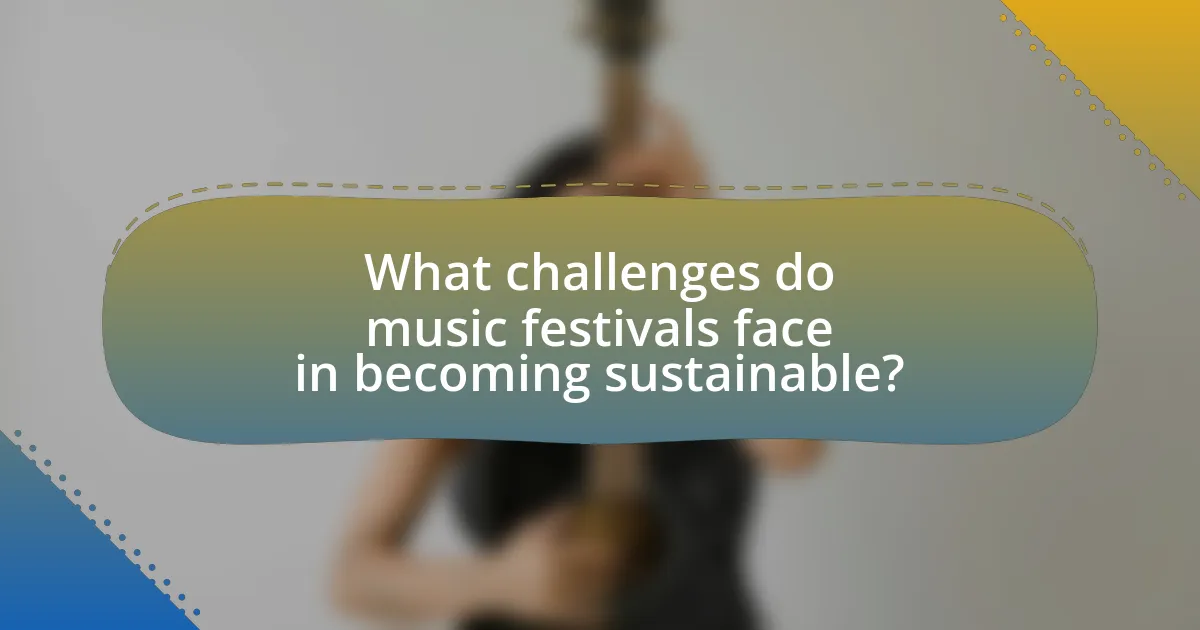
What challenges do music festivals face in becoming sustainable?
Music festivals face significant challenges in becoming sustainable, primarily due to waste management, energy consumption, and transportation emissions. Waste management is a critical issue, as festivals generate large amounts of trash, with studies indicating that a typical festival can produce up to 1,000 tons of waste, much of which is not recycled. Energy consumption poses another challenge, as many festivals rely on fossil fuels for power, contributing to greenhouse gas emissions. Additionally, transportation emissions from attendees traveling to and from the festival sites further complicate sustainability efforts, with transportation accounting for approximately 70% of a festival’s carbon footprint. These factors collectively hinder the ability of music festivals to implement effective sustainability practices.
What are the financial implications of adopting sustainable practices?
Adopting sustainable practices in music festivals can lead to significant financial benefits, including cost savings, increased revenue, and enhanced brand value. For instance, implementing waste reduction strategies can lower disposal costs by up to 30%, as evidenced by the 2019 Coachella festival, which reported a 25% reduction in waste management expenses after adopting recycling and composting initiatives. Additionally, festivals that prioritize sustainability often attract a larger audience, as 70% of millennials are willing to pay more for eco-friendly events, thereby increasing ticket sales and sponsorship opportunities. Furthermore, sustainable practices can enhance a festival’s reputation, leading to long-term partnerships and loyalty from attendees and sponsors, ultimately contributing to greater financial stability and growth.
How do sponsorships affect sustainability initiatives?
Sponsorships significantly enhance sustainability initiatives by providing essential funding and resources that enable the implementation of eco-friendly practices. For instance, major music festivals often partner with brands that prioritize sustainability, allowing them to invest in renewable energy sources, waste reduction programs, and carbon offset initiatives. A study by the University of California found that festivals with corporate sponsorships focused on sustainability saw a 30% increase in their green initiatives compared to those without such partnerships. This financial support not only facilitates the adoption of sustainable technologies but also raises awareness among attendees, promoting a culture of environmental responsibility within the music festival community.
What logistical challenges arise when implementing sustainability measures?
Implementing sustainability measures in music festivals presents logistical challenges such as waste management, resource allocation, and supply chain coordination. Waste management becomes complex due to the need for effective recycling and composting systems, which require additional infrastructure and staff training. Resource allocation is challenged by the necessity to source sustainable materials and products, often leading to increased costs and limited availability. Supply chain coordination is hindered as organizers must collaborate with vendors who prioritize sustainability, which can complicate procurement processes and timelines. These challenges are evidenced by studies indicating that festivals adopting sustainability measures often face higher operational costs and logistical complexities, as highlighted in the 2021 report by the International Music Summit.
How do festivals balance sustainability with profitability?
Festivals balance sustainability with profitability by implementing eco-friendly practices that also attract attendees and sponsors. For instance, many festivals adopt waste reduction strategies, such as using biodegradable materials and promoting recycling, which can lower disposal costs and enhance brand image. Additionally, festivals often incorporate local food vendors and sustainable transportation options, which not only reduce carbon footprints but also support local economies, thereby increasing community engagement and ticket sales. A study by the Green Music Initiative found that festivals that prioritize sustainability can see a 20% increase in attendance, demonstrating that eco-conscious practices can lead to higher profitability while fostering environmental responsibility.
What strategies can festivals use to remain financially viable while being sustainable?
Festivals can remain financially viable while being sustainable by implementing strategies such as diversifying revenue streams, enhancing sponsorship opportunities, and adopting eco-friendly practices that reduce costs. Diversifying revenue streams can include offering tiered ticket pricing, creating VIP experiences, and selling merchandise that emphasizes sustainability. For instance, festivals like Coachella have successfully introduced various ticket packages that cater to different audience segments, increasing overall attendance and revenue.
Enhancing sponsorship opportunities involves partnering with brands that align with sustainability values, which can attract funding while promoting eco-friendly initiatives. For example, the Glastonbury Festival collaborates with environmentally conscious brands, which not only supports their sustainability goals but also provides financial backing.
Additionally, adopting eco-friendly practices such as waste reduction, renewable energy use, and sustainable transportation options can lower operational costs. Festivals that implement comprehensive recycling programs and utilize solar power can significantly reduce waste disposal fees and energy costs. The Bonnaroo Music and Arts Festival has reported savings through its waste diversion efforts, showcasing that sustainability can lead to financial benefits.
These strategies demonstrate that financial viability and sustainability can coexist, as evidenced by successful festivals that have integrated these approaches into their operations.
How can partnerships enhance sustainability efforts without compromising profits?
Partnerships can enhance sustainability efforts in music festivals by leveraging shared resources and expertise, which can lead to cost savings and increased efficiency. For instance, collaborating with local businesses for waste management and recycling initiatives can reduce operational costs while promoting eco-friendly practices. A study by the Green Music Initiative found that festivals that partnered with sustainable vendors reduced waste by 30% and improved their overall environmental impact without incurring additional expenses. This demonstrates that strategic partnerships can align sustainability goals with profit margins, creating a win-win scenario for both the festival organizers and their partners.
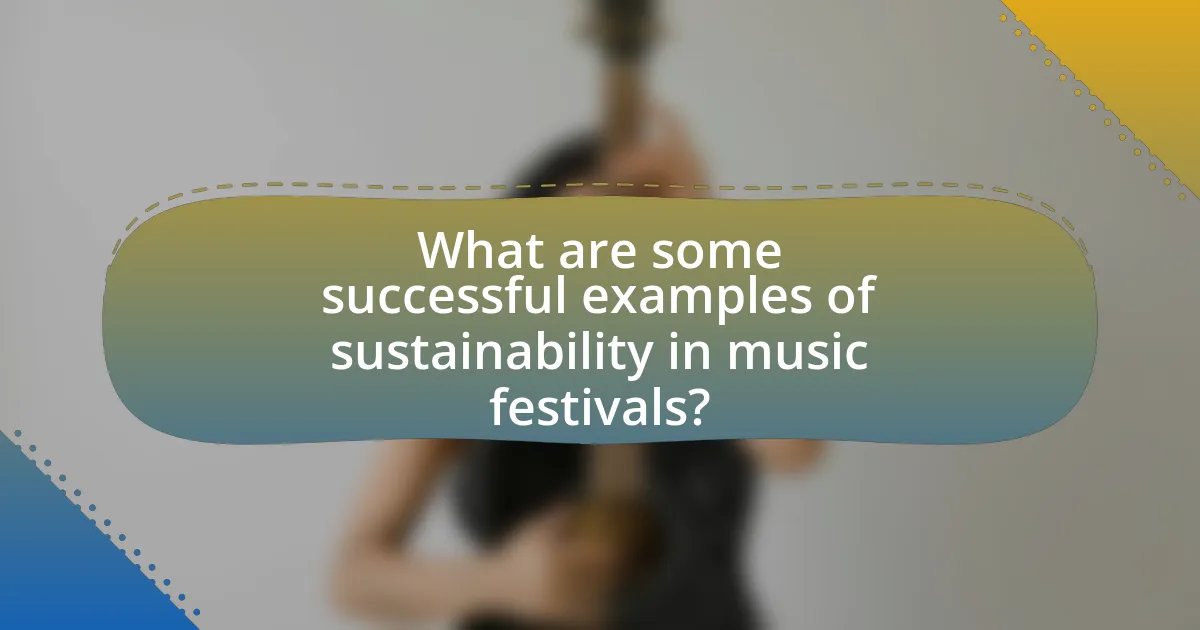
What are some successful examples of sustainability in music festivals?
Some successful examples of sustainability in music festivals include Glastonbury Festival, which has implemented a comprehensive waste management system, achieving a 50% reduction in waste sent to landfills by 2019. Another example is the Coachella Valley Music and Arts Festival, which has invested in solar energy, powering a significant portion of its operations with renewable energy sources. Additionally, the Shambhala Music Festival has adopted a “leave no trace” policy, encouraging attendees to minimize their environmental impact, and has been recognized for its efforts in promoting local food sourcing and composting initiatives. These festivals demonstrate effective strategies for reducing environmental footprints while enhancing attendee experiences.
Which festivals are recognized for their sustainability initiatives?
Several festivals are recognized for their sustainability initiatives, including Glastonbury Festival, Coachella, and Tomorrowland. Glastonbury has implemented a range of eco-friendly practices, such as banning single-use plastics and promoting renewable energy sources, which has earned it accolades for its commitment to sustainability. Coachella has introduced measures like a comprehensive recycling program and the use of solar power to reduce its carbon footprint. Tomorrowland is known for its efforts in waste management and biodiversity conservation, actively engaging in reforestation projects. These festivals exemplify how large-scale events can adopt sustainable practices to minimize environmental impact.
What specific practices have these festivals implemented?
Music festivals have implemented specific practices such as waste reduction initiatives, renewable energy usage, and sustainable transportation options. For instance, festivals like Glastonbury have introduced extensive recycling programs, aiming for zero waste by encouraging attendees to bring reusable items and providing ample recycling bins. Additionally, Coachella has invested in solar energy to power stages, significantly reducing its carbon footprint. Furthermore, many festivals promote carpooling and public transport to minimize emissions associated with travel. These practices are part of a broader trend within the sustainability movement in the music festival industry, reflecting a commitment to environmental responsibility.
How have these practices impacted their overall success?
The sustainability practices implemented in music festivals have significantly enhanced their overall success by attracting a larger audience and improving brand reputation. For instance, festivals that adopt eco-friendly initiatives, such as waste reduction and renewable energy use, have reported increased ticket sales and higher attendee satisfaction. A study by the University of California found that 70% of festival-goers prefer events that prioritize sustainability, indicating a direct correlation between these practices and audience engagement. Additionally, festivals like Glastonbury and Coachella have seen a boost in sponsorship deals and partnerships due to their commitment to environmental responsibility, further solidifying their market position.
What lessons can be learned from successful sustainable music festivals?
Successful sustainable music festivals demonstrate the importance of comprehensive waste management strategies. These festivals often implement rigorous recycling and composting programs, significantly reducing landfill waste; for instance, the Glastonbury Festival achieved a 50% reduction in waste sent to landfills by enhancing its recycling efforts. Additionally, successful festivals prioritize renewable energy sources, such as solar and wind power, to minimize their carbon footprint; Coachella, for example, has invested in solar energy, which powers a substantial portion of its operations. Furthermore, engaging attendees in sustainability initiatives, like encouraging the use of public transport or carpooling, fosters a culture of environmental responsibility; studies show that festivals promoting such practices can reduce transportation emissions by up to 30%. These lessons highlight that effective sustainability practices not only enhance environmental outcomes but also improve the overall festival experience for attendees.
How can other festivals replicate these successful strategies?
Other festivals can replicate successful sustainability strategies by implementing comprehensive waste management systems, promoting local vendors, and utilizing renewable energy sources. For instance, festivals like Glastonbury have achieved a 50% reduction in waste through extensive recycling and composting initiatives, which can serve as a model for others. Additionally, by prioritizing local food and beverage suppliers, festivals can reduce carbon footprints and support community economies, as demonstrated by the success of the Coachella Valley Music and Arts Festival in sourcing locally. Furthermore, transitioning to renewable energy, as seen at the Bonnaroo Music and Arts Festival, can significantly lower greenhouse gas emissions and operational costs. These strategies are proven to enhance sustainability while also improving attendee experience and community engagement.
What common pitfalls should festivals avoid when pursuing sustainability?
Festivals should avoid the pitfall of superficial sustainability efforts, which often include token gestures like recycling bins without comprehensive waste management plans. Superficial efforts can mislead attendees about the festival’s actual environmental impact, undermining credibility. Additionally, festivals must not overlook the importance of engaging local communities and stakeholders in sustainability initiatives, as exclusion can lead to resistance and negative perceptions. A lack of measurable goals and transparency in sustainability practices can also hinder progress, as seen in studies indicating that clear metrics are essential for accountability and improvement. Lastly, neglecting to educate attendees about sustainable practices can result in missed opportunities for behavioral change, as festivals that actively promote sustainability awareness tend to foster more environmentally conscious audiences.
What practical steps can music festivals take to enhance sustainability?
Music festivals can enhance sustainability by implementing waste reduction strategies, such as providing recycling and composting stations, and encouraging the use of reusable containers. For instance, festivals like Glastonbury have successfully reduced waste by over 50% through these initiatives. Additionally, they can promote sustainable transportation options, such as public transit and carpooling, which can significantly lower carbon emissions; the Coachella Valley Music and Arts Festival reported a 30% increase in carpooling in recent years. Furthermore, sourcing local and organic food vendors minimizes the carbon footprint associated with food transportation and supports local economies. Festivals like Bonnaroo have prioritized local sourcing, resulting in fresher food and reduced environmental impact. Implementing renewable energy sources, such as solar panels, can also decrease reliance on fossil fuels; for example, the Electric Forest Festival has utilized solar energy to power stages and facilities. These practical steps collectively contribute to a more sustainable festival experience.
What are the best practices for reducing waste at music festivals?
The best practices for reducing waste at music festivals include implementing a comprehensive recycling program, encouraging the use of reusable containers, and providing adequate waste disposal stations. A comprehensive recycling program can significantly decrease landfill contributions; for instance, festivals like Glastonbury have reported recycling rates exceeding 50% by offering clearly marked bins for different materials. Encouraging the use of reusable containers, such as water bottles and food containers, reduces single-use plastics; studies show that festivals promoting this practice can cut plastic waste by up to 80%. Additionally, providing adequate waste disposal stations, strategically placed throughout the venue, ensures that attendees have easy access to proper waste management, which can lead to a cleaner environment and higher participation in recycling efforts.
How can festivals engage attendees in sustainability efforts effectively?
Festivals can effectively engage attendees in sustainability efforts by implementing interactive initiatives that promote eco-friendly practices. For instance, festivals can organize workshops on recycling, composting, and sustainable living, allowing attendees to learn and participate actively. Research indicates that hands-on experiences significantly increase awareness and commitment to sustainability; a study by the University of California found that participants in interactive sustainability programs were 60% more likely to adopt eco-friendly behaviors post-event. Additionally, festivals can incentivize sustainable choices by offering discounts for using public transport or providing rewards for reducing waste, further encouraging attendees to engage in environmentally responsible actions.





